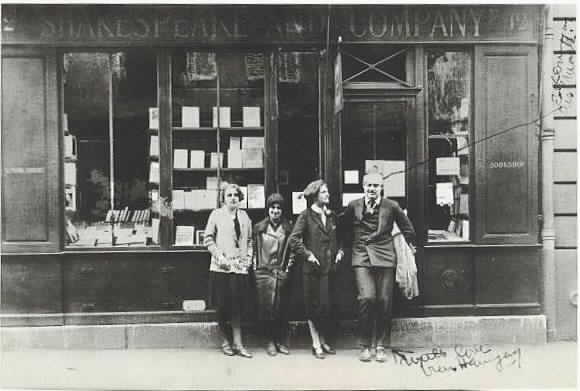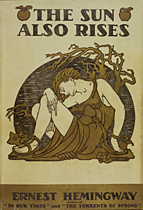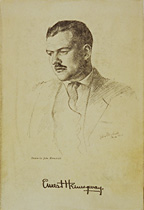Notes
(22) poules = "hens," slang for prostitutes [French].
(49) Mencken = H. L. Mencken
(1880-1956), essayist and critic of the American middle class, whom he
called the "booboisie." He also defined Puritanism as "The haunting
fear that someone, somewhere, may be happy."
(60) pelouse . . . pesage = "turf" (grass racing track)
.
. . "paddock" (where the horse owners hang out) [French].
(62) tromper = "deceive" [French].
(83) bateau mouche = "fly-boat," tourist boats that cruise up
an
down the Seine in Paris.
(120) like Henry's bicycle —a reference to a mysterious accident
in Henry James' youth that affected his sexual performance.
(126) Bryan = William Jennings Bryan (1860-1925), former
Secretary of State, crusader for conservative causes like Prohibition.
He was the
prosecutor at the famous Scopes
"monkey trial" which debated the teaching of evolution. Another page
about the trial. And another: (possibly
more than you want to know about the trial.)
(136) afición = "love of bullfights. It also means the
entire
bull ring public, but is usually used in this generic sense to denote
the most intelligent part of the public" ("Explanatory Glossary," Death
in the Afternoon).
1. One of Hemingway's original titles for the book was The Lost
Generation. In what ways are the people in the novel lost? In what
ways has expatriate life in Paris corrupted the characters?
2. What do we learn about Jake's insecurities and conceptions of
masculinity from his attitudes towards Robert Cohn and the gays at the
dance club (28-29)?
3. Why do you think Jake picks up Georgette? (See pp. 22-28.) What
do
you think it takes to be "one of us" (40, 67)?
Why do you think Harvey Stone and Frances give Cohn such a hard time?
Why is Frances going to England (55)?
4. Compare / contrast Jake's relationship to Brett with Cohn's
relationship to Frances. (For example, compare how each man is treated
by the women.
Why do you think the women act as they do in these relationships?)
5. Compare / contrast Jake and Cohn. How does the fact that Jake
went
to war and Cohn did not make them different from each other? In what
ways
are they like / unlike the rest of their friends? In what ways are they
both outsiders?
6. In what ways is Count Mippipopolous like / unlike Jake and his
friends? What do you think the count means by "values" (67)? (See p.
120.) Why do
you think Brett says he's "dead"? What sort of "values" (78, 152, 156)
does Jake have? Do you think he sticks to them?
7. Why do you think Hemingway includes the stories of the drummer
(69-71) and the boxer (76-78)? What do you think goes in the ". . . . .
." on pp. 70-71?
8. Comment on some implications of the word "blind" (61, 105, 141)
in the text. Do you think Jake prays for the right things in Pamplona
(102-03)? What do you think is so "nice" and so "awful" (107) about
Robert Cohn?
9. Why do you think Cohn is verbally abused so often in the novel?
Is
it because he is Jewish? (See pp. 101-02, 104, 145-48, 181.) Why do you
think Mike attacks Cohn but not Jake,
whom Brett actually loves? Why do you think Cohn accepts so much abuse?
Why does he finally lash out (194-99)?
10. Bill tells Jake that "Sex explains it all" (121). To what extent
is Bill's statement true of the novel The Sun Also Rises? In
what ways are Brett, Jake and Cohn alike? (See pp. 101, 146-148,
163-64, 166, 179, 186-88, 194-99.)
11. Do you find Lady Brett Ashley to be a sympathetic character? Do
you think she is a positive female role model? In what ways is her
treatment
of her male friends justified or unjustified? What do you Jake means
when he says "the woman pays and pays and pays" (152)?
12. Read closely and analyze one of the longer passages in which
Hemingway describes bulls or bullfighting. What sort of language does
Hemingway use? Does the passage have symbolic possibilities? If the
bullfighting passages do not advance the plot, how do they function to
develop themes and motifs?
13. Analyze the novel in the context of World War I. How does the
experience of war shape the characters and their behavior? Examine the
differences
between the veterans, like Jake and Bill, and the nonveterans, like
Cohn
and Romero.
14. Discuss the problem of communication in the novel. Why is it so
difficult for the characters to speak frankly and honestly? In what
circumstances is it possible for them to speak openly? Are there any
characters who say exactly what is on their mind? If so, how are these
characters similar to each other?
Back to:
ENG 383 Syllabus
Hemingway Links (ENG 383 Links
page)
Mike Webster's home page
Webster's Courses


